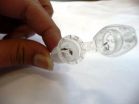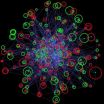Current decisions shape your future preferences
2010-09-24
(Press-News.org) Psychologists have known for a long time that after you make a choice, you adjust your opinion to think better of the thing you chose. Now a new study has found that this is true even if you don't know the options that you're choosing between.
People change their minds about a choice after they make it. If you ask someone how he feels about Athens and Paris, he might rate them the same. But after you make him choose one as a vacation destination, he'll rate that city higher. This is thought to be a way to reduce the psychological tension that is created by rejecting one perfectly reasonable alternative and picking another one.
But recently critics have pointed out a flaw in this experimental design: the person might actually have already liked Paris more than Athens, but for some reason this preexisting preference didn't show up when he was asked to rate them.
Tali Sharot and Raymond J. Dolan of University College London and Cristina M. Velasquez of Lake Forest College set out to improve on the experimental design. They asked people to rate a list of vacation destinations, and then choose between pairs of places. Next, the participants were told they were taking part in a test of subliminal decision making: they would have to choose between the names of two vacation destinations shown on a screen, side by side, for two milliseconds. However, what actually flashed on the screen was nonsense strings (such as "%^!x *&()%), so the participants were making a completely blind choice. After the test was finished, they were told which place they'd chosen and were asked to rate the destinations again.
Indeed, people's evaluations of the destinations they chose improved; if they blindly chose Thailand, they rated it higher after the test than they did before. The study is published in Psychological Science, a journal of the Association for Psychological Science.
"It's a relief to know that psychologists are right about this basic principle," says Tali Sharot. But "The effect is much smaller than what we usually see when we do non-blind choice." This means that the critics were right to point out the flaw in the usual experimental design; people do have a preexisting preference, even if it's not strong enough to show up in ratings. Her team has also found this to be true using functional MRI studies, a kind of imaging that shows activity in the brain.
###
For more information about this study, please contact Tali Sharot at t.sharot@fil.ion.ucl.ac.uk.
The APS journal Psychological Science is the highest ranked empirical journal in psychology. For a copy of the article "Do Decisions Shape Preference? Evidence From Blind Choice" and access to other Psychological Science research findings, please contact Keri Chiodo at 202-293-9300 or kchiodo@psychologicalscience.org.
END
ELSE PRESS RELEASES FROM THIS DATE:
2010-09-24
Across the globe, the diversity of plant and animal species generally increases from the North and South Poles towards the Equator but surprisingly that rule isn't true for soil bacteria, according to a new study by Queen's University biology professor Paul Grogan.
"It appears that the rules determining the patterns for plant and animal diversity are different than the rules for bacteria," says Professor Grogan.
The finding is important because one of the goals in ecology is to explain patterns in the distribution of species and understand the biological and environmental ...
2010-09-24
A new technique pioneered at Liverpool School of Tropical Medicine (LSTM) is improving the detection and monitoring of insecticide resistance in field populations of an important malaria-carrying mosquito.
Researchers at LSTM, led by Dr Charles Wondji have developed a new technique which encourages the female Anopheles funestus mosquitoes to lay eggs which are then reared into adult mosquitoes to provide sufficient numbers to determine levels of insecticide resistance and to characterise the underlying mechanisms.
Explaining the significance, John Morgan, who designed ...
2010-09-24
Researchers at Mount Sinai School of Medicine have found that the costs of care for patients with cancer who disenrolled from hospice were nearly five times higher than for patients who remained with hospice. Patients who disenroll from hospice are far more likely to use emergency department care and be hospitalized. The results are published in the October 1 issue of the Journal of Clinical Oncology.
Led by Melissa D.A. Carlson, PhD, Assistant Professor of Geriatrics and Palliative Medicine, and Elizabeth H. Bradley, PhD, Professor of Public Health at Yale University, ...
2010-09-24
A non-stick coating for a substance found in semen dramatically lowers the rate of infection of immune cells by HIV a new study has found.
The new material is a potential ingredient for microbicides designed to reduce transmission of HIV, a team from the University of Rochester Medical Center and the University of California, San Diego reports in a forthcoming issue of the Journal of Biological Chemistry.
The coating clings to fibrous strings and mats of protein called SEVI–for semen-derived enhancer of viral infection–which was first discovered just three years ago. ...
2010-09-24
Like a well-crafted football play designed to block the opposing team's offensive drive to the end zone, the body constantly executes complex 'plays' or sequences of events to initiate, or block, different actions or functions.
Scientists at the University of Rochester Medical Center recently discovered a potential molecular playbook for blocking cardiac hypertrophy, the unwanted enlargement of the heart and a well-known precursor of heart failure. Researchers uncovered a specific molecular chain of events that leads to the inhibition of this widespread risk factor. ...
2010-09-24
Troy, N.Y. – Individuals within a networked system coordinate their activities by communicating to each other information such as their position, speed, or intention. At first glance, it seems that more of this communication will increase the harmony and efficiency of the network. However, scientists at Rensselaer Polytechnic Institute have found that this is only true if the communication and its subsequent action are immediate.
Using statistical physics and network science, the researchers were able to find something very fundamental about synchronization and coordination: ...
2010-09-24
In research led by a Saint Louis University surgeon, investigators found that women who give birth after suffering pelvic fractures receive C-sections at more than double normal rates despite the fact that vaginal delivery after such injuries is possible. In addition, women reported lingering, yet often treatable, symptoms following their pelvic fracture injuries, from urinary complications to post-traumatic stress disorder.
The study, published in Clinical Orthopaedics and Related Research, retrospectively reviewed the cases of 71 women who had suffered pelvic fractures, ...
2010-09-24
PASADENA, Calif.—Computers, light bulbs, and even people generate heat—energy that ends up being wasted. With a thermoelectric device, which converts heat to electricity and vice versa, you can harness that otherwise wasted energy. Thermoelectric devices are touted for use in new and efficient refrigerators, and other cooling or heating machines. But present-day designs are not efficient enough for widespread commercial use or are made from rare materials that are expensive and harmful to the environment.
Researchers at the California Institute of Technology (Caltech) ...
2010-09-24
RENO, Nev. – Like the little engine that could, the University of Nevada, Reno experiment to transform wastewater sludge to electrical power is chugging along, dwarfed by the million-gallon tanks, pipes and pumps at the Truckee Meadows Water Reclamation Facility where, ultimately, the plant's electrical power could be supplied on-site by the process University researchers are developing.
"We are very pleased with the results of the demonstration testing of our research," Chuck Coronella, principle investigator for the research project and an associate professor of chemical ...
2010-09-24
WASHINGTON– In recent decades, the rate at which humans worldwide are pumping dry the vast underground stores of water that billions depend on has more than doubled, say scientists who have conducted an unusual, global assessment of groundwater use.
These fast-shrinking subterranean reservoirs are essential to daily life and agriculture in many regions, while also sustaining streams, wetlands, and ecosystems and resisting land subsidence and salt water intrusion into fresh water supplies. Today, people are drawing so much water from below that they are adding enough ...
LAST 30 PRESS RELEASES:
[Press-News.org] Current decisions shape your future preferences




